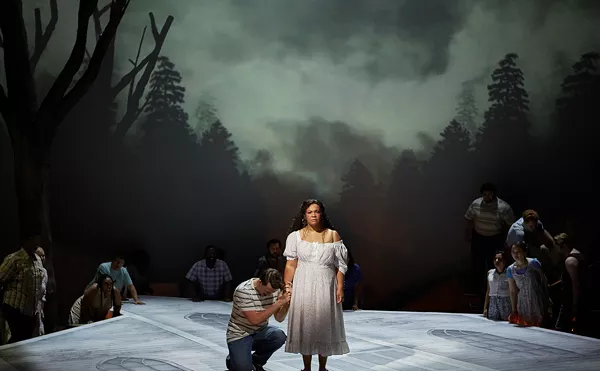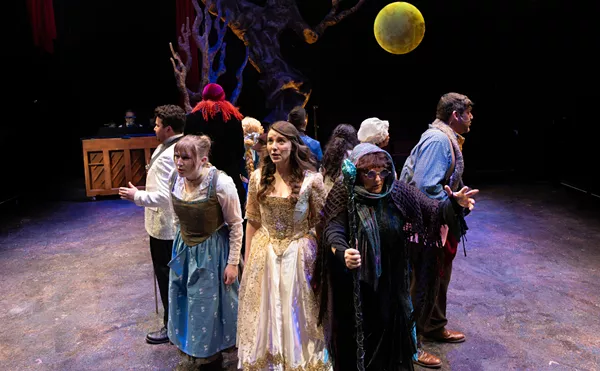Margaret B. Stearns
Opera Theatre of St. Louis
Paul Schoenfield's The Merchant and the Pauper, which received its world premiere Thursday evening, was commissioned by Opera Theatre of St. Louis and will undoubtedly become (as have several other OTSL-commissioned operas) one of the contemporary operas that will enjoy real success throughout the United States and the world.
Schoenfield's score, always tuneful and tickling of the ear, is both accessible and musically interesting. Margaret B. Stearns' libretto, based on one of Rabbi Nachman of Bratslav's fairy tale/allegories, though occasionally a bit more explanatory than absolutely necessary, is witty, clear and as dramatic as allegory allows.
John DeMain, the opera's conductor, sets a satisfying pace, and he keeps the intricacies of the orchestral score before us clearly, like a handsome carpet. Mark Lamos' stage direction could move a bit more — too often the opera's central characters, the Merchant's son (baritone Marcus DeLoach) and the Pauper's daughter (the ravishing soprano Madeline Bender), just stand around. On the whole, however, DeMain keeps things lively enough, and his work with Cary John Franklin's superbly prepared chorus is especially delightful. Andrew Lieberman's sets are simple but most appealing — together with Constance Hoffman's whimsical costumes, Christopher Akerlind's lights and John Roslevich Jr.'s handsome props, I often felt I was gazing at one of the lush children's books of the late 1930s come to life.
I was simply bowled over by Bender's performance as Beauty, the pauper's exceedingly beautiful (of course) daughter, who is also an allegory for the Shekhinah, the embodiment of Jewish spirituality. Bender's person is indeed beautiful, and her voice is rich and honeyed, with a dark, cellolike quality that blends handsomely with DeLoach's brilliant, full-bodied baritone in their several duets.
Because the Merchant himself (Thomas Barrett) is also a baritone and the Narrator (Spiro Malas) a bass-baritone (with a particularly musical voice, by the way), it is pure inspiration to give the nasty parts (the Wicked General, the Pirate and the Evil One itself) to counter-tenor Yaacov Zamir, who puts a wire edge on his voice as part of his consistently delightful if shuddery characterizations. Mephistopheles can continue as a baritone, but Zamir has convinced me that Satan is a counter-tenor.
Mezzo-soprano Julia Anne Wolf, who plays the Pauper's wife and Beauty's mother, is another one with a rich, darkly hued voice, and tenor Thomas Trotter, the Pauper, is at his best as he scat-sings (!) his lies, calumnies and slanders of the Merchant.
All in all, The Merchant and the Pauper is one of OTSL's most successful new operas on every level, with the sort of music that should compel young people to the Loretto-Hilton and the sort of theater that will delight any spectator. Congratulations to all involved in the debut of such a promising new work.Madeline Bender in The Merchant and the PauperPRINCELY PAUPERphoto by Ken Howard





